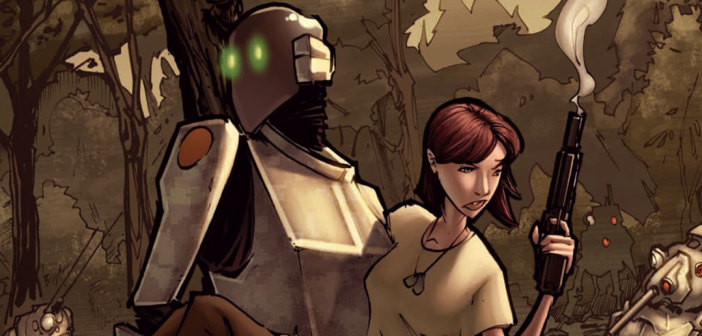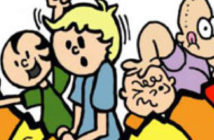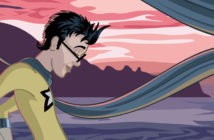When I reviewed the first issue of Drone back in September 2009, I gave credit to writer Scott Chitwood for creating a comic based on an interesting topic of growing importance in our very real world of warfare. “The theme of war and the morality behind it floats around the unfolding plot of Drone #1 like a bobbing question mark, forcing readers to ask themselves how they would feel about advanced robotics in warfare,” I originally said.
But when I finished the first issue, I was also worried that future installments of the four-part miniseries were going to degenerate into a bad knockoff of Terminator. Well, the drones in this book are not sentient (not yet, anyway), but regardless, there’s nothing stopping me from reading it as a weak attempt at mimicking the past works of James Cameron. The only tidbit I garnered from the conclusion of Drone #2 is the sad realization that the final two issues are going to be little more than a high-tech cat-and-mouse chase between the good guys and the bad guys.
In this second installment, we meet up again with David, Mark, and Phil; the three nerdy friends who hacked into the American government’s top-secret drone project being utilized to fight a war in Kazakhstan. David, who is controlling the only functional drone after an enemy combatant named Hassan, who wants the drones for himself, attacked the laboratory outpost where the drones are situated. And to help himself out with the scientific side of the drone technology, Hassan has enlisted the help of a Chinese scientist named Chang, who also wants the drone technology for his own country. Yes, I know: it’s boilerplate at best.
The rest of the issue crumbles into a back-and-forth relay race between the heroes and the villains. And David certainly must be a hero, because he rescues a woman from the clutches of Hassan named Catherine, who carries with her the manual override codes that can reactivate the drones. Hassan must really want these drones because he pulls out all of the stops by unleashing his own—drones? Yes, it seems the enemy also has robots, which caused me to wonder more than once why America’s technology is so desperately needed when Hassan clearly has his own. Can’t he just upgrade?
I’m particularly hard on the work of Scott Chitwood and artist Randy Kintz because Drone is quickly turning into a large-scale miss of an opportunity. I’m bored when I read the book, counting how many pages until I’m finished. The characters are wooden and one-dimensional when they’re not just bad stereotypes. The plot is sadly predictable when one cares enough to predict what’s going to happen next.
The missed opportunity is spelled out in what I originally wrote about the debut issue: shouldn’t Drone serve as some kind of thematic message by presenting readers with the dangerous reality of advanced robotics in warfare? It’s not my intention to turn this comic book into a political sacrificial lamb, but then again, I didn’t choose to create Drone. This is a very real scenario playing out today in the real world, and art mimics life for not only entertainment, but context. Unfortunately, I find only ambiguity here, a gray vagueness masquerading behind a tired story and hollow characters.
This comic book review originally appeared on Broken Frontier on 13 January 2010.




